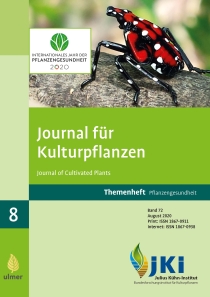Modelling of climate-sensitive pests in plant health
DOI:
https://doi.org/10.5073/JfK.2020.08.14Keywords:
Monitoring, Species distribution model (SDM), pest risk analysis (PRA), invasive species, plant health, climate-sensitive pests, ecological modelling, agricultural insect pestsAbstract
Climate-sensitive pests are those whose risk of causing damage is likely to change significantly due to predicted climatic changes. They therefore pose a particular challenge to plant health. In order to predict the establishment and spread potential of these pests, an assessment under various environmental and management scenarios is essential. Process-oriented simulation models are an efficient tool to investigate the occurrence and spread of climate-sensitive pests. In the project ‘ProgRAMM’ (Proactive phytosanitary risk analysis through modelling and monitoring: adaptation to long-term risks caused by climate-sensitive pests) such a model based on species-specific physiological parameters and distribution characteristics is being developed. With this model the above mentioned predictions and scenario analyses can be carried out. A transferable, generalized open-source modelling framework will be established as a standard procedure to support plant health risk analyses (PRA) of climate-sensitive pests. A particular focus is on the fact that the model is easily extensible and that it can be easily coupled with a different set of additional host plants, plant databases, different climate data sets as well as new presence/absence data of pests. The results of the model are presented graphically in the form of distribution and risk maps. The results can be used in PRAs to better assess the economic and ecological risks of a pest. In addition, the high-risk areas for the occurrence of pests will be identified to support the planning of efficient monitoring activities. The open source license along with the modular nature of the model components will ensure transferability to pest groups such as fungi, insects, mites, nematodes and bacteria. This will also enable the extension of the model by different sub-models as well as by species-specific functions and parameterization.
Downloads
Published
Issue
Section
License
The content of the journal is licensed under the Creative Commons Attribution 4.0 License. Any user is free to share and adapt (remix, transform, build upon) the content as long as the original publication is attributed (authors, title, year, journal, issue, pages).
The copyright of the published work remains with the authors. The authors grant the Journal of Cultivated Plants, the Julius Kühn-Institut and the OpenAgrar repository the non-exclusive right to distribute and exploit the work.







